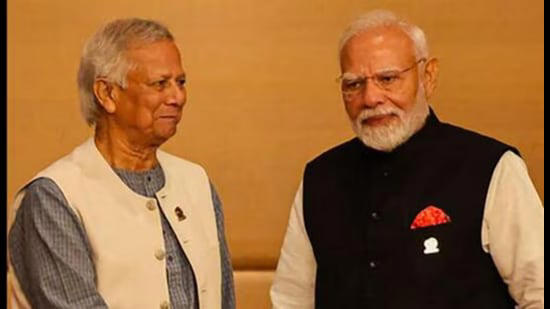The capital of Bangladesh, Dhaka, came to an uncomfortable standstill on Thursday as the International Crimes Tribunal-1 was set to announce the date for delivering its verdict in a historic case against former Prime Minister Sheikh Hasina, who led the country during last year’s people’s uprising amid allegations of crimes against humanity. The tribunal announced on Thursday that it would deliver its verdict against Ms. Hasina and her two former top associates on November 17. Efforts surrounding the announcement of the verdict date sparked widespread tension across the country. Typically crowded streets in Dhaka were quiet as Ms. Hasina’s now-banned party, the Awami League, implemented a ‘Dhaka lockdown’ to protest against the ‘politically motivated trial.’ Fewer passengers were seen at metro railway stations, and several universities and schools postponed in-person classes due to security concerns. Shahadat Ho Sen Antor, a student at Stamford University in Dhaka, said, ‘In-person classes have been postponed due to the lockdown, and lectures are now being conducted online.’ “When I went near the Moghbazar and Ban Gallemotor areas of the capital, which are usually busy, I saw only a few vehicles on the roads. There was a sense of restlessness among the people outside.” In Tejgaon, the capital, transport owner Mohammad Su Mon said that after hearing reports of vehicles being set on fire, he had instructed his drivers to keep their buses off the roads. He said, “I didn’t want to take any risks, but I will have to bear the loss as my vehicles remained idle.” To prevent potential violence, high-security law enforcement agencies, including the police, Rapid Action Battalion (RAB), and Border Guard Bangladesh (BGB), were deployed in Dhaka. Earlier in the day, the police had set up checkpoints at several key locations in Dhaka and searched vehicles. Dozens of Awami League activists were attacked and later handed over to the police after attempts to take action in various parts of the country. Several buses were set on fire in the capital and other places. On Thursday afternoon, the Awami League center in the capital was also set on fire. Amid the lockdown program, leaders and activists of Jamaat-e-Islami, Bangladesh Nationalist Party (BNP), and other like-minded political parties and their student organizations took to the streets in almost all districts of the country. They were seen holding their sit-in programs at various important intersections in the capital since morning. Speaking to The Hindu on Thursday evening, Awami League joint secretary A.F.M. Bahauddin Nasim said that the police have arrested dozens of party leaders and activists across the country.
He said, “BNP-Jamaat supporters attacked our activists right in front of the police. Despite this, our lockdown was successful. People from all walks of life took to the streets in protest of this show trial. The nationwide response and people’s solidarity towards the lockdown prove that people reject this ridiculous process. Not only in Dhaka, but across the country, large crowds took to the streets to express their anger. I congratulate them for their courage and support.” Four-day program: Mr. Nasim told The Hindu that the Awami League is going to announce a four-day program concerning demands including the resignation of Bangladesh’s interim chief Mohammad Yunus and the dissolution of the tribunal formed against Ms. Hasina. He stated that nationwide demonstrations, protests, and large-scale campaigns will be held on November 14 and 15, followed by a nationwide complete shutdown on November 16 and 17.Mr. Naseem called on the people of Bangladesh, Awami League leaders and activists, the 14-party alliance, and all progressive forces to participate in the blockade. The tribunal, chaired by Justice Mohammad Golam Murtuja Mozumdar, set the date for the verdict after both the prosecution and defense completed their closing arguments last week. The case also names former Home Minister Asaduzzaman Khan Kamal and former Inspector General of Police Chowdhury Ab Dullah Al-Mamun, the latter of whom later became a witness as a co-accused. Chief Prosecutor Mohammad Hammad Tajul Islam and other prosecutors were present during the hearing. Representing the prosecution, Chief Prosecutor Tajul Islam and Attorney General Mohammad Asaduzzaman demanded the maximum sentence for the accused, while Mr. Hussain claimed their innocence and sought their acquittal. Ms. Hasi,Ms. Hasina, who ruled Bangladesh for more than 15 years, fled to India on August 5, 2024, following a large-scale student-led rebellion that toppled her government. The tribunal is prosecuting her in absentia for alleged crimes against humanity during the July uprising, in which hundreds of people were killed. During the trial, a total of 54 witnesses testified, including relatives of the victims of the rebellion. Besides this case, Ms. Hasina is facing two other cases before the International Criminal Tribunal, one related to disappearances and killings during her tenure.

Posted inPolitics


Comments are closed